- Home
- Robert Hellenga
The Sixteen Pleasures Page 4
The Sixteen Pleasures Read online
Page 4
“Could you take me to a pensione, please?”
“Where?”
“Something near the center, if that’s possible, but nothing fancy.”
He turned and gave me an incredulous look without slowing down. He was steering with his left hand, moving the wheel back and forth as if he were trying to keep a small sailboat on a difficult course.
“Non c’è. There’s nothing, Signorina. You have to go to Fiesole.”
“How much will it cost?”
“Ten thousand lire.”
I divided by sixteen hundred. About six dollars.
“Are the buses running?”
“Not tonight. Maybe tomorrow.”
“There’s nothing in town?”
“Niente. Nothing.”
We had circled the Fortezza da Basso and were heading back to the station. It was raining harder now, not a downpour but steady. Was there going to be a second flood? Was it possible to have two floods so close together, or would it take more time for the water to build up in the lakes and rivers up in the surrounding hills, wherever the Arno comes from? I suddenly realized how little I knew about the hydrodynamics of the earth. But my immediate problem was to find a room for the night.
“Va bene,” I said. “Fiesole.”
We completed the circle and were soon heading north again. I sank back into the seat, exhausted. The man kept talking, one horror story after another: eleven people drowned in the underground passageway by the station; guard dogs trapped in basements; men trapped in stalled cars and drowned; the patients at the insane asylum had climbed out on the roof; twenty horses drowned at the Cascine park. His brother-in-law’s furniture shop in Santa Croce completely destroyed. The popolo minuto, the little people, ruined. And still the government had done nothing.
Though there wasn’t much traffic, we were going uncomfortably fast down a street I didn’t recognize when suddenly the car lurched to the side. Cloppety-cloppety-cloppety. Cloppety-cloppety-cloppety. A flat tire. At first I thought the man was simply going to ignore it and keep going—it’s a wonder he didn’t ruin the rim—but at last he pulled over to the curb, put his head down on the steering wheel and started to cry softly to himself. His wife and son had gone to Siena, he said after a while, to stay with her mother, who had never liked him. No water in his apartment, no electricity, no heat and now it was going to flood again.
I was startled by a staticky voice out of nowhere. I couldn’t tell what it was saying, but it roused the driver, who picked up a microphone and shouted into it that he had a gomma a terra. More static. More shouting.
“I’m sorry,” I said. “Is there anything I can do?”
“Nothing. Make it stop raining.”
“I don’t think it can flood again, not for a while,” I said helpfully. The rain drumming on the roof of the cab was so loud I had to shout.”
He pulled on his hat and got out of cab. I could hear the sound of the trunk opening and feel the car vibrating slightly as he jacked it up.
My habit of looking for signs had not deserted me. The cadet, the receding lights of the train, the American women. And now a flat tire, a gomma a terra. The world seemed pregnant with meanings, all contradictory. I was thinking how nice it would have been if Ruth and Yolanda had been in the dark cab with me—then it would have been an adventure instead of a depressing nuisance—when I noticed a difference in the sound the rain was making, and a light at the window.
Which I rolled down to get a look. I was a little startled to see a man’s face, barely six inches from my own, peering intently at me. He was holding in one hand one of the huge green umbrellas that you see in shops and at all the markets, holding it over the driver while he struggled with the spare tire. In the other he held a flashlight. He was a man in his fifties, clean shaven, and his face, beaming under a Borsalino, wore a slightly amused expression.
There was no wind, so the driver and the man were fairly well protected by the huge umbrella. He smiled and rolled his eyes upward in a meaningful way, as if to suggest that the management ought to be called to account. His presence was cheering, and I wanted to break into the circle of his charm, to place myself under his umbrella, so to speak, so I asked him if he knew where I could find an inexpensive pensione. It was the only thing I could think of.
“Mais non,” he said, and began to speak rapidly in French. “ . . . difficile . . . le centre . . . une deluge . . . Fiesole . . . rien à bon marché.” I believe he was saying what I knew already, that there was nothing in the center of town and I’d have to go to Fiesole, but I wouldn’t find anything cheap.
How odd, I thought, to meet a Frenchman under such circumstances.
“She speaks Italian,” I heard the driver say.
“Of course,” the man said in Italian, addressing the driver on the pavement beneath him, “but I’m something of a linguist, and I detected a French accent.”
“Stop that man,” I said, reverting to my textbook French. “Arrêtez cet homme. Il a volé mon parapluie.”
He started to laugh, and I started to laugh, too.
“You have a very fine umbrella,” I said in Italian.
“Merci beaucoup,” he said, and then added, in Italian, “But I see you are not French after all. Please excuse me.”
He gave me an opportunity to reveal my true linguistic identity, which I declined to do, and then went on. “There’s been a flood, seven meters of water in Santa Croce, you won’t find a thing in the city, you’ll have to go to Fiesole, and you won’t find anything cheap, believe me.”
“I know there’s been a flood,” I said.
“Then what are you doing here?”
“I thought I could be of use.”
“Si, si. Un angelo di fango?”
A mud angel? I hadn’t any idea what he was talking about.
“Of course,” he continued, “you could stay with me. My apartamento is full of flood refugees from the lower floors, but one more wouldn’t matter. No electricity, no running water, no heat”—a litany I heard many times in the next few days—“but dry.”
“No no, I couldn’t. I’d better go on to Fiesole.”
“You speak firmly,” he said, “like a woman who has made up her mind.”
“You’re very kind, but I think it would be better.”
“Magari.”
Magari. One of those untranslatable words that sometimes rate a separate chapter in books on Italy.
I could feel the driver tightening the lugs, and soon we were ready to go. The mysterious stranger, as I thought of him, offered cigarettes. The mysterious stranger with a green umbrella. The driver accepted; I declined.
“ArrivederLa.”
“Piacere.”
I rolled up the window and pulled my coat around me. The driver smoked his cigarette. “You’re an americana, aren’t you?”
“Si.”
“I was thinking you were an americana, but you speak good Italian.”
“Grazie.”
“Prego. You know what I think, if you’ll excuse me?”
“Tell me.”
“He was a nice man, molto gentile.” I leaned forward in the dark, to hear what he had to say. “But you did the right thing, saved yourself a lot of trouble.” I leaned back.
Of course I’d done the right thing. I couldn’t possibly have gone with him. But I appreciated the invitation, and in fact the whole incident left me with a good feeling, like a chance to warm myself at a cozy fire before turning in for the night.
The Pensione Medici was certainly not cheap, but it was more than comfortable—a double bed, an enormous wardrobe, private bath with bidet, and a view of the city. From my window, on what turned out to be a crisp, clear morning, I could look right down the Via Fiesolana, where Claudia’s grandparents lived, right down at the gloomy Protestant Cemetery in the Piazza Donatello,
final resting place of Elizabeth Barrett Browning and another poet named Clough, pronounced “Cluf.” By eight o’clock I had packed my things, but I was reluctant to leave this lovely room, to exchange it for . . . ? The prospect of calling on friends whom I hadn’t seen or heard from (mea culpa) for ten years was more daunting than I had anticipated. I imagined them now, married to people I didn’t know, living in small apartments full of children and dogs. I put these visions aside for the moment and told myself not to worry. I had a return ticket. I could always go home, it was too soon to worry. But I suppose that was the problem: I could always go home. “Home is the place where when you have to go there, they have to take you in.” Mama used to quote that line a lot. Somehow the idea tickled her. But there was something unsettling about it too.
I was surprised to find the breakfast room full of Americans. Declining an invitation to join a large noisy table, I sat at a small table by myself, where I could enjoy the view, and made a point of speaking Italian to the signorina who brought caffelatte, sweet butter, apricot preserves, and two slabs of day-old pane toscano. My instinctive aversion to American tourists was something I’d picked up from Mama, but as I listened to the conversations going on all around me I realized I was surrounded not by tourists but—even worse!—old Florence hands, old soldiers happy to be in harness again, exchanging observations about the flood, displaying their knowledge of the city and its history for the benefit of their admiring subordinates, graduate-student types, serious young men in their mid-twenties. Like me, they had come to Florence to offer their assistance. Like me, each had no doubt come for private reasons, too. Why was I so quick to judge?
I left my room key at the desk and walked out into a briskish sort of day, crisp and cold and sunny, like November in the Midwest. A limousine was waiting to whisk away some of the dignitaries; lesser persons were hurrying to catch the number 7 bus that was waiting in the piazza. I refused to hurry, and the bus left without me. I let it go, deciding as I did so to give myself up to the day, to give myself the day, one day without a plan, to follow my feet, as Papa used to say, to look at the political posters left over from the last election: Communist, Socialist, Christian Democrat; and the four-color circus posters, too, repeated in threes: elephants, polar bears on bicycles drinking glasses of milk, a young woman somersaulting through space, arms outstretched toward a pair of muscular hands coming down out of nowhere. In theory I was an existentialist, a creator of meaning and value, but in reality of course I was a seeker. I couldn’t help trying to read the world like a book of signs: the cadet, the receding lights of the train, the American women, the beaming face of the man with the umbrella and now the circus posters. Who would catch me as I somersaulted through space?
I soon found myself heading not down toward Florence but up toward Monte Ceceri and Settignano, which like Fiesole is situated on one of the hills that rim the city. You’re always heading somewhere, even if you’re just following your feet without a plan. Mama and I had often taken this walk. Was I heading in this direction because I was thinking of Mama, or was I thinking of Mama because I was heading in this direction?
I stopped at a Casa del Popolo—one of the bars sponsored by the Communist party—for a cappuccino, as Mama and I had often done. It was two years later that she got sick, but the cancer that killed her must already have been at work when we were walking together, with every puff of the cigarettes she smoked. Powerful French cigarettes with no filters. She smoked in the bar, and she smoked as we walked, and I complained, but I liked the smell of the smoke in the open air, like the smell of leaves burning in the fall.
Mama had bought an enormously detailed military map so that we didn’t have to stick to the roads. If you passed even the tiniest shed on the side of the path, you’d be able to find it on the map. We used to get a lot of pleasure from the map, joking that if it were much bigger it would be a full-scale map, a map as big as the country itself. You’d lay it over the country like a blanket of snow, and everything would match up, or not match, depending on how well the cartographers had done their work.
I didn’t have a map with me now, but I was sure I’d remember the way somehow. You couldn’t get too lost because the road was to your left and the city itself in the valley to your right, though in fact—now that I remember it—Mama and I managed to get lost every time we went out. We’d pore over our map as we went along, but then we’d get to talking, and pretty soon we’d be lost. But then we’d run into a road, or we’d come up to the edge of the valley and find the city at our feet: the Duomo, the Palazzo Vecchio, Santa Croce, Santa Maria Novella, the Uffizi, the Pitti Palace, the Badia, the Bargello, the green dome of the synagogue right across the street from our first apartment. This was Mama’s city, her spiritual home, the place where it all began: Giotto, Michelangelo, Leonardo, the Medici . . . , the cradle of the Renaissance, the discovery of the world and of man.
But there was another city too, my city. My city was the Liceo Morgagni and the Paperback Book Exchange on the Via Fiesolana, and the bar behind the Mercato Centrale where you could get real American hamburgers, with everything on them, wrapped in waxed paper. When someone mentioned San Marco I didn’t think of Fra Angelico but of the periodic student strikes that we voted on in school, each class voting separately. I never understood the issues, but I loved the camaraderie and the demonstrations, which took place in Piazza San Marco. My city was bus passes and the old cheese factory where we had our gym class once a week, and all the houses (apartments, actually) where I could ring the bell and someone would be glad to see me.
When I first came to Italy with Mama, in 1952 when I was fifteen, I was scared to death, but Mama, who was going to be in charge of a study-abroad program for American college students, was expecting heaven on earth. Which it was, in a way. But in retrospect. While we were living through it, it was mixed. There were almost no study-abroad programs at the time, so there was no one to turn to for advice. It was difficult to find good housing for the students. The families with whom they lived didn’t want to report the money as income, which created tax problems, and the police—the Questura—wanted to know everything about the students, including how much they were paying the families they were going to live with. The students themselves were unhappy and disoriented. They were allowed only two showers a week; the girls couldn’t wash their hair every day; their rooms were poorly lit; the weather was unbearably hot; the teachers at Linguaviva, the language school that had contracted to locate host families and to teach the students some Italian, were strict and unsympathetic. And so on. Moreover, the program itself had no legal status because it didn’t own any property.
And Mama and I had our own housing problems. Our apartment, across the street from the back of the synagogue, was roomy but unsatisfactory. The arrangement of the rooms made no sense: there was no place to sit down comfortably. From the picture window you could see the green dome of the synagogue but not much else. The people below us were always angry because our bathtub leaked into their apartment; the toilet clogged. And worst of all, it was brand new. I think Mama would have put up with all these inconveniences if only we’d been living in a medieval tower or a fifteenth-century palazzo, but in a brand-new building they were intolerable.
I had my troubles too, which added to Mama’s. There was an American school, but Mama said it was too far out of town and too expensive. She’d already given me three hundred dollars in cash, as a bribe, to get me to agree to go to an Italian school—it had seemed like a good idea at the time—and I’d already spent the money, so there was nothing I could do about it, even when the principal at the Liceo Classico Dante informed us that the school’s experience with foreigners who knew no Italian had been so bad that he was unwilling to admit me, even though I had all my school records with me, from kindergarten through ninth grade, translated into Italian and stamped with a raised seal from the Italian Consulate in Chicago.
I was studying Italian at Linguaviva, b
ut I didn’t seem to be getting anywhere. The classes were large, and the other students (mostly German and Scandinavian girls in their twenties) were loud and aggressive. I went to classes for a month, but I still couldn’t speak Italian and I didn’t seem to have a friend in the world.
By the end of the summer we had become regulars at the American Church. Mama would never have admitted it, but we needed help. It was an Episcopal church, and there was lots of kneeling on leather-covered steps that folded out of the pew in front of you like the steps of a kitchen stepstool. Mama was not a religious woman, but I think she was actually praying, which was scary. I don’t know if her prayers were answered or not, but things suddenly took a dramatic turn for the better, just as if someone had heard us and sent a fairy godmother to see what could be done. A fairy godfather, actually. A man with the euphonious name of Bruno Bruni, whom we met at the church itself at the coffee hour after the service. Signor Bruni was a godsend. He introduced Mama to the principal of the Liceo Scientifico Morgagni, a warm welcoming woman who said she would be very happy to have me in her school, that it would be difficult at first, but that her experience with foreigners who didn’t know the language had been extremely encouraging. He placated the inquisitive Questura and helped us find a more satisfactory apartment, in Borgo Pinti, not far from the Duomo, one that was ancient on the outside and quite convenient and charming inside. I could look out my window in the morning and down on a little fruit market. I took dozens of pictures of it but never got it quite right.

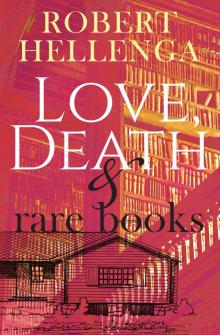 Love, Death & Rare Books
Love, Death & Rare Books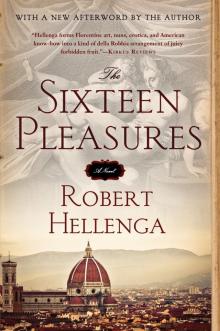 The Sixteen Pleasures
The Sixteen Pleasures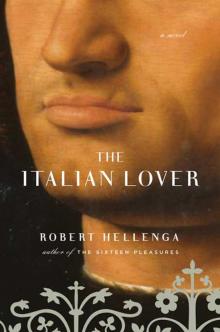 The Italian Lover
The Italian Lover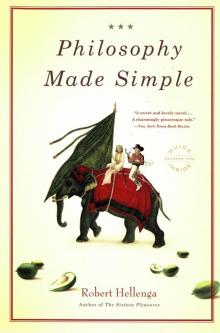 Philosophy Made Simple
Philosophy Made Simple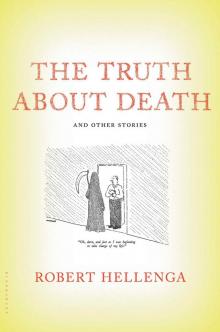 The Truth About Death
The Truth About Death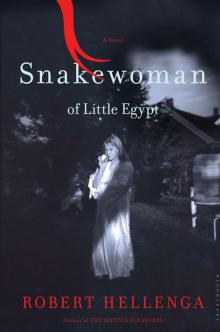 Snakewoman of Little Egypt
Snakewoman of Little Egypt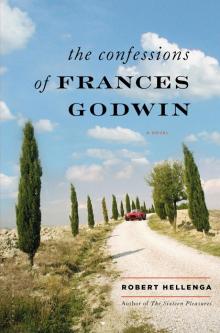 The Confessions of Frances Godwin
The Confessions of Frances Godwin